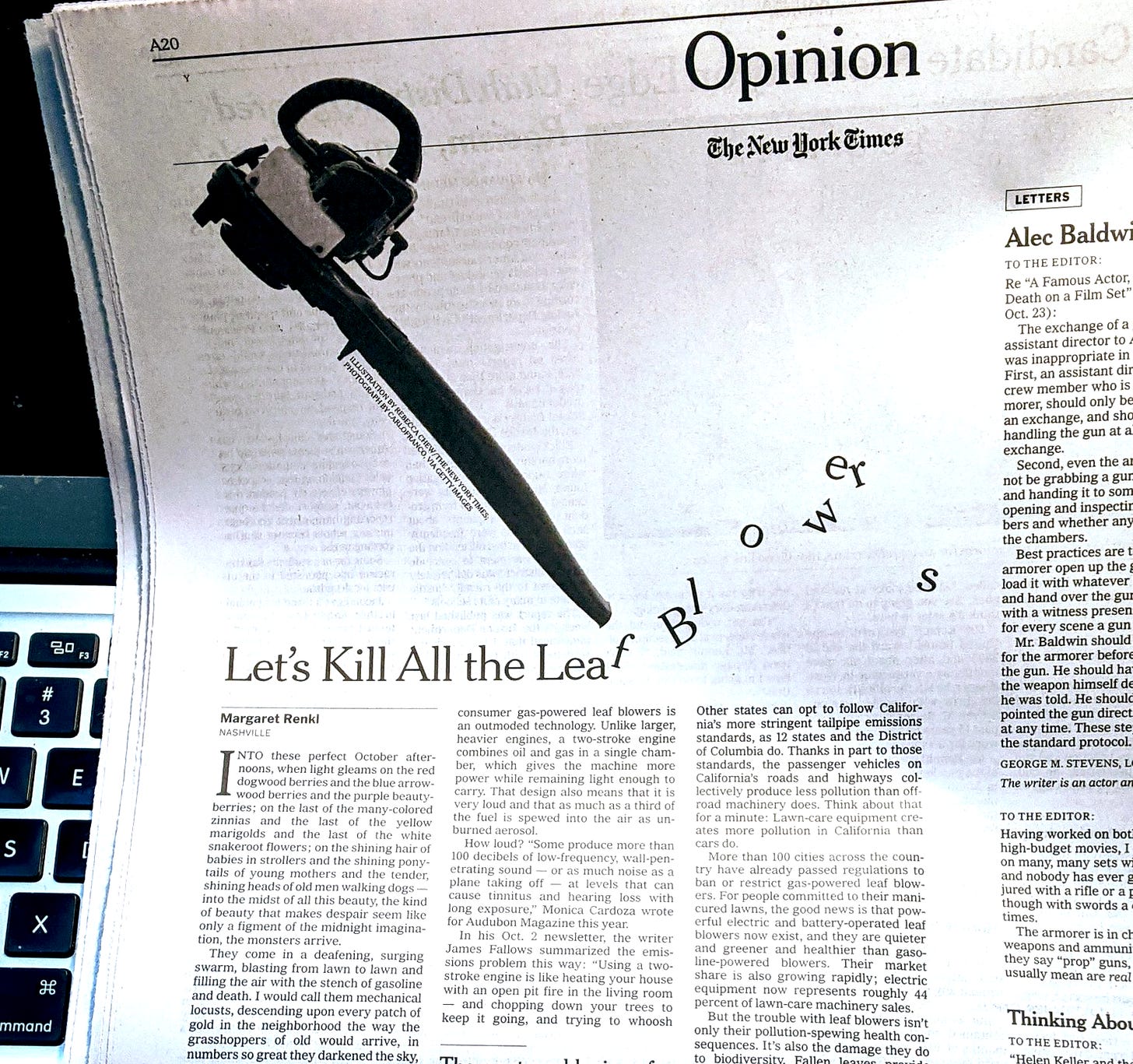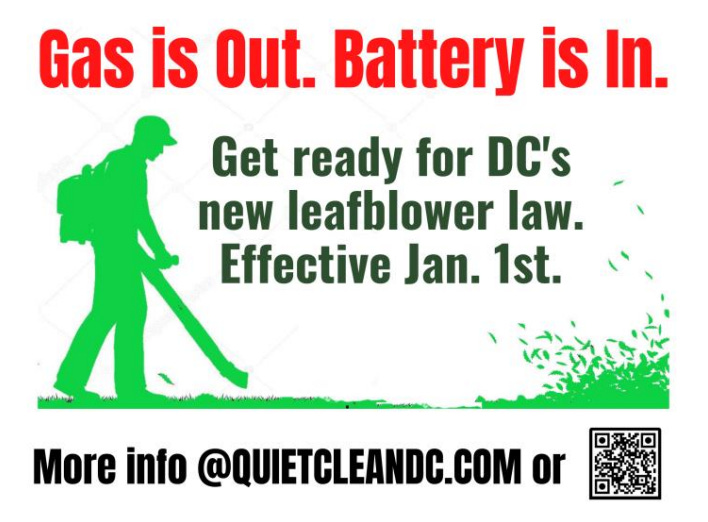Weekend Reading: November 5 Edition
Flying cars are coming. Leaf blowers are going. The college-ranking struggle continues. And other themes to read, act on, and discuss.
This post is a pre-weekend sampling of links, leads, updates, and previews on subjects I’ve covered recently and will dig into again.
1. Leaf blowers
Last month I posted this long piece, “The End is Nigh.” For developments since then I hope you’ll check out:
An eloquent, powerful piece by the writer Margaret Renkl, which ran as a lead editorial in the New York Times with the title “Let’s Kill All the Leaf Blowers.”
An equally powerful opinion piece by Jason Munshi-South in the Stamford Advocate, called “Turn off the blower and let the leaves be this fall.” Munshi-South is a biology professor and emphasized the surprisingly vast damage that today’s mechanized “tidy lawn” fetish does to bird life, insects, plants, and other natural systems.
A section called “DC’s New Law” at the Quiet Clean DC website in Washington. It lists rules, steps, FAQs, possible sources of financial aid, and other info, as the District of Columbia nears its ban on gas-powered blowers eight weeks from now. (This comes after a three-and-a-half year transition period). The site also discusses the “environmental justice” aspects of the shift, here. Meanwhile signs like this are going up around the area:
2. Rankings
I’ve done two recent pieces on this theme: “The College Rankings Racket” and “The Rankings Racket Goes to Kindergarten.” There is a lot of ongoing action in this field.
Here are two background-study leads, each of which will be the subject of more detailed discussion later:
On the Poets & Quants site, a deputy dean at the Yale School of Management named Anjani Jain recaps a statistical question he has been raising about business-school rankings from Bloomberg Business Week.
The issue is highly technical but fascinating and potentially important. For now, check out the basics of Jain’s argument at the link above and also here. I’ll return to it soon—after I try a few more times to get an answer from BBW. (So far, no reply.)From Michael Crow, the endlessly innovative president of Arizona State University, a Chronicle of Higher Education essay called “The Way We Classify Colleges is All Wrong,” co-authored with the education writer Jeffrey Selingo; and a presentation on better ways to classify and assess higher education now. More to come on these themes as well.
As I mentioned in my original pieces, since US News-style rankings simply aren’t going away, the most useful response is to foster more ratings and rankings, based on more varied criteria, which better reflect the opportunities available to students and the difference that schools have made. Like those from The Washington Monthly, which rank institutions based on “what they do for the country,” the ASU concepts are a positive step.
3. American Renewal
On the Our Towns Civic Foundation website, several recent entries worth highlighting:
From Carl Hunt and a range of co-authors, an original and insightful five-part series on the new meanings of “power” at the local, national, and global levels. You can start with this final installment in the series, which includes a recap and overview by Ben Speggen, and follow the connected threads of the argument by Hunt and his colleagues.
A video from last week’s discussion at the Rural Women Everywhere virtual conference, hosted by the Rural Assembly. This session featured three of the small-town and rural leaders Deb Fallows and I have met and written about. They are Tracy Taft, a civic organizer in Ajo, Arizona; Lora Whelan, a newspaper writer and editor in Eastport, Maine; and Joanna Tabit, a circuit judge in Charleston, West Virginia. Whelan and Tabit both played prominent parts in our HBO film. Deb Fallows and Ben Speggen led the discussion. It found it very much worth seeing.
A new installment from Deb, on the way libraries are re-inventing themselves for the realities of the pandemic era.
4. Better airports. Faster and more sustainable travel. Zero-emission flying cars.
They’re coming! Over the past few weeks I have been talking with people inventing things like these, and more. Details, possibilities, complications, and so forth, in dispatches ahead.
5. Will subscriptions save us?
The “us” in this case is not writers like me, and “subscriptions” are not those on services like Substack—although my friend (and occasional nemesis) Jack Shafer has a new column about the momentum behind the Substack model.
Instead these are “subscriptions” of the sort I discussed yesterday: Ways to avoid the ever-growing clutter of search-engine ads, through subscription-based, ad-free services.
My main advice in that piece was: Try out a new no-ad service called Neeva, and see if it’s right for you. I like it and find that it fits my working style, but that’s an individual matter. Neeva is still on a free-trial basis and will eventually cost around $5 per month.
The larger point of the piece was to ask what users, technologists, entrepreneurs, and others could do in response to the era’s ad-clogged “attention economy.”
Two answers I’ve heard:
Several people sent links to this 2020 Medium essay, “Free is Evil,” by Jesse Hercules. This too is very much worth reading.
Marty Manley, a well-known entrepreneur, consultant, and writer, responded this way to my “advertising dystopia” post:
I'd love to get your thoughts on a related question: why does search and social media not have a subscription option?
I can watch a movie for free if I want to see ads. If I dislike the ads, I can subscribe to an ad-free streaming service. Google's average revenue per user is about $6.50/month, last I looked. Fine - I will pay you $80 per year for search (about what I pay them for storage). Google does not need to track me, because I don't get any ads (I grant that my search results might suffer a tad if I'm anonymous, but that's fixable with opt-in controls).
Better yet, a law might require all social media companies to offer subscriptions for an ad-free experience. If Facebook and Twitter are not cluttering their feeds with ads and their servers with user profiles, the world would be a better place, even if many users choose the free option. Likewise, Google search results would be entirely organic.
I am sure that there is a business case for not doing this, but as a guy who has started and run tech companies, I can't see it. Worse, I never see this issue debated.
Let's provoke the debate.
Please do write in with ideas and responses, and I’ll look forward to guiding a discussion.





